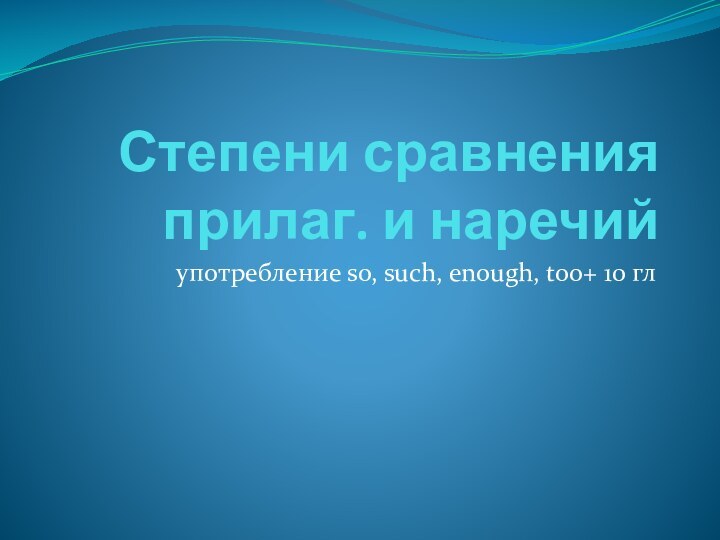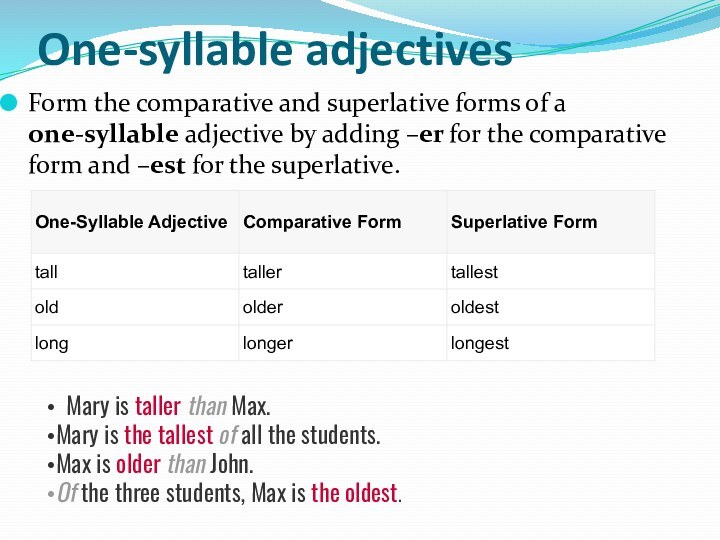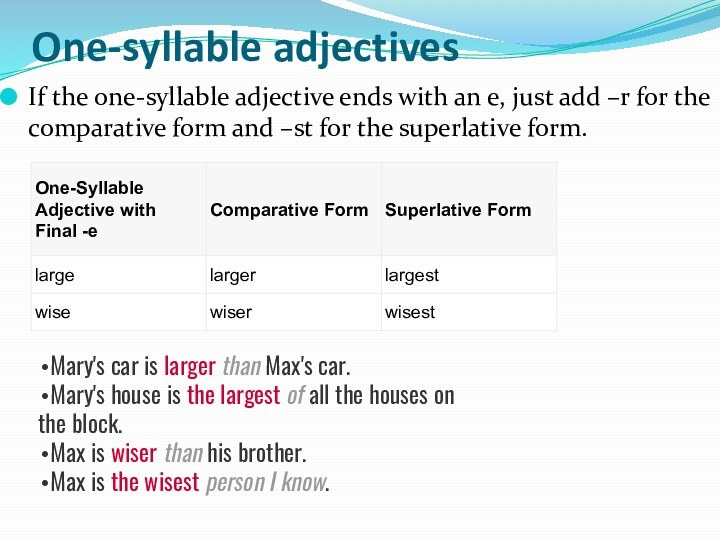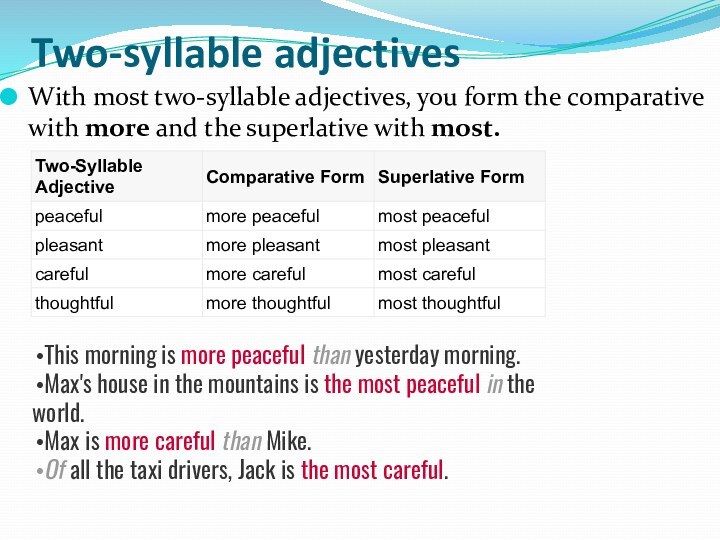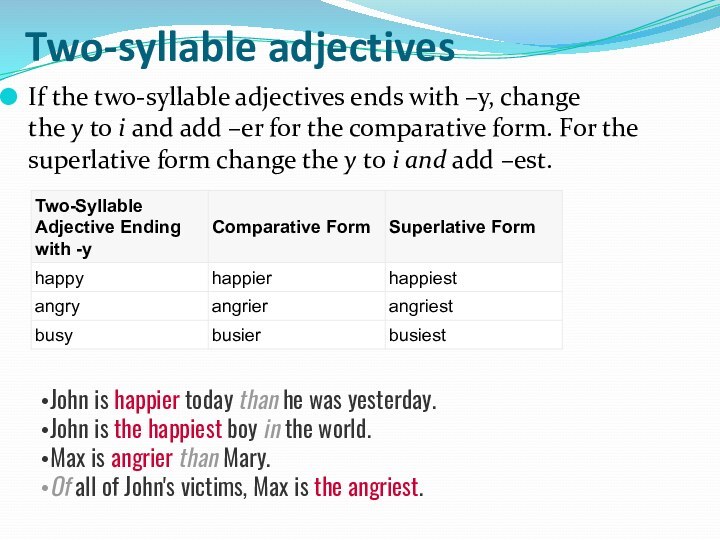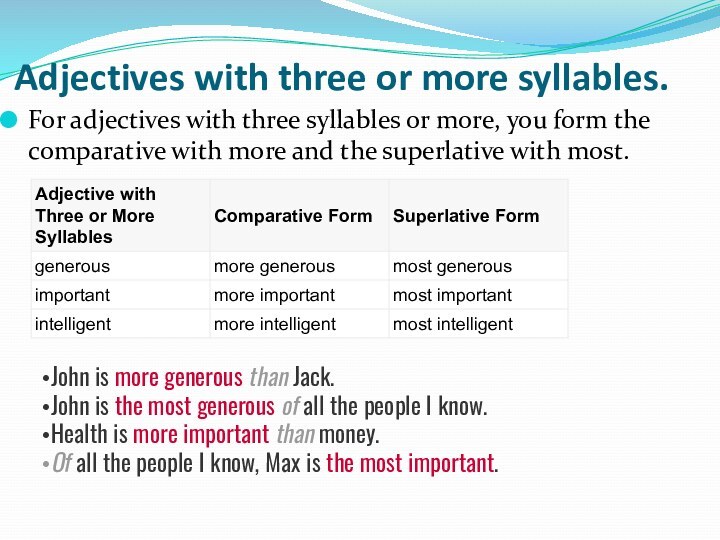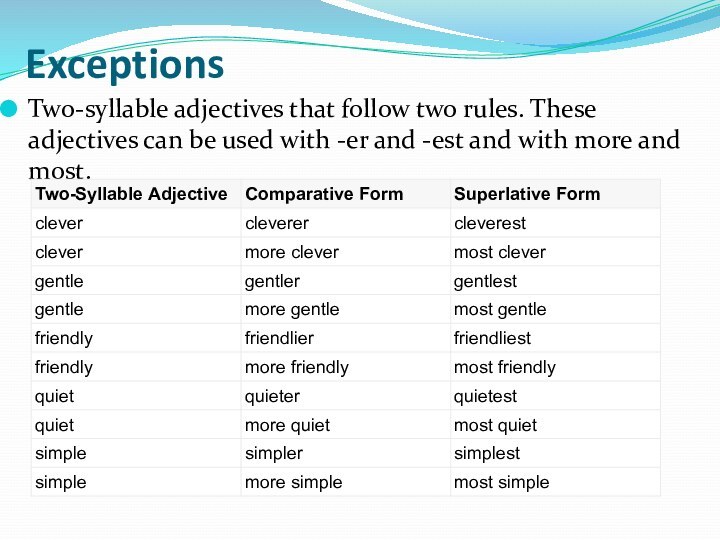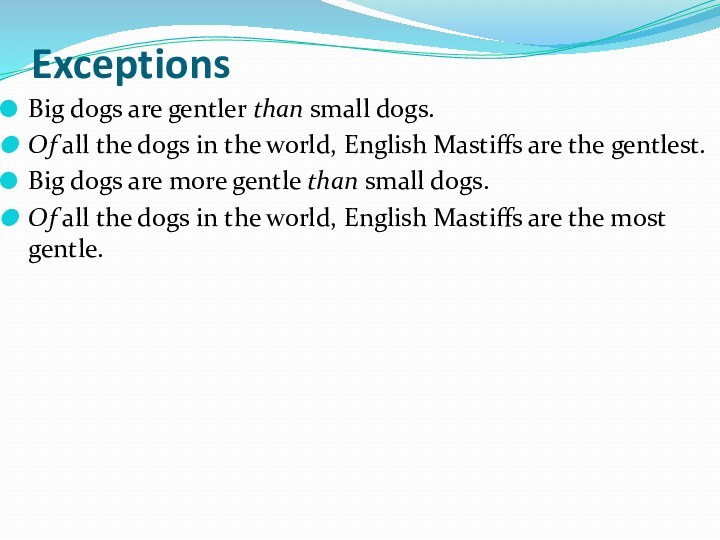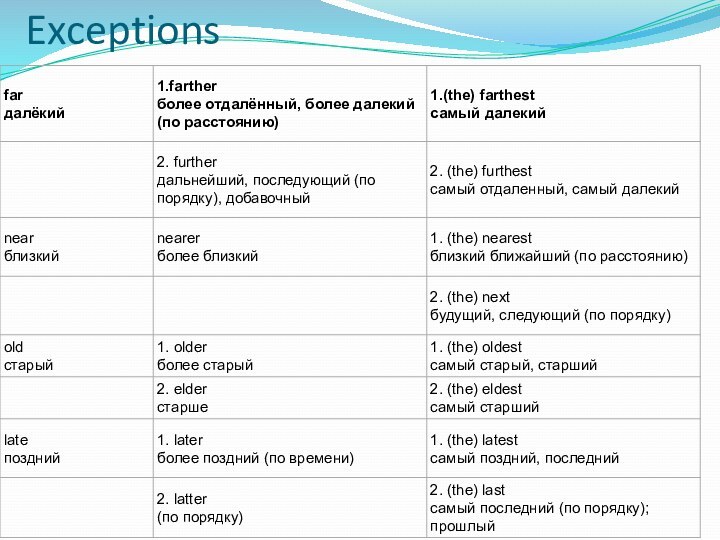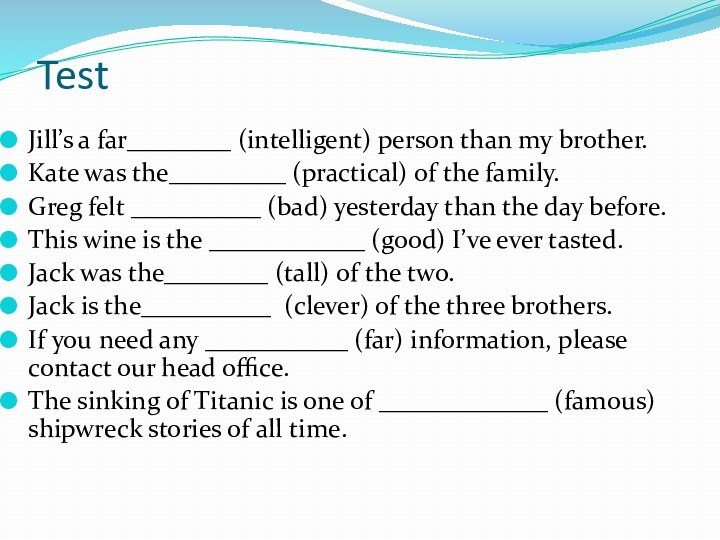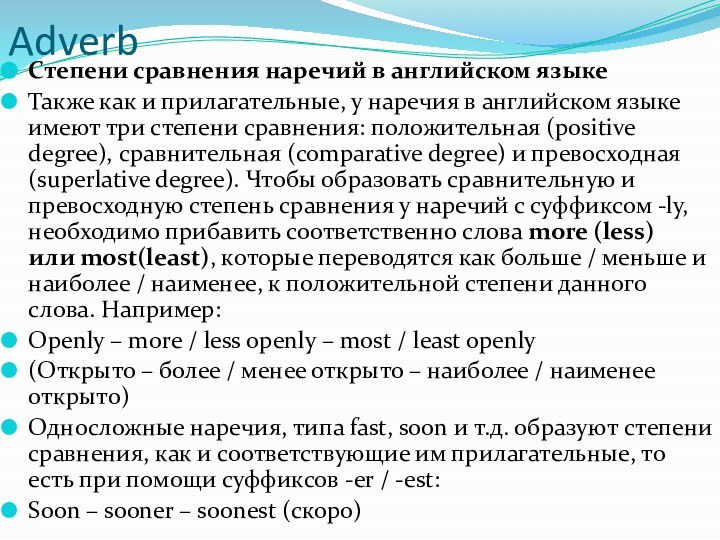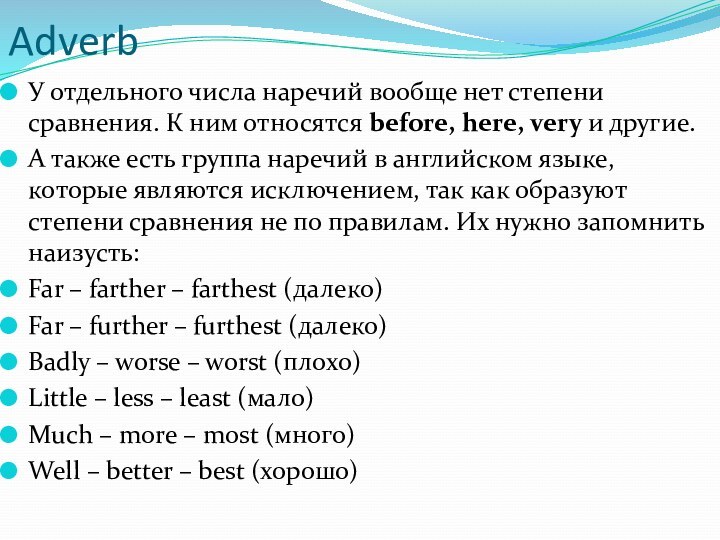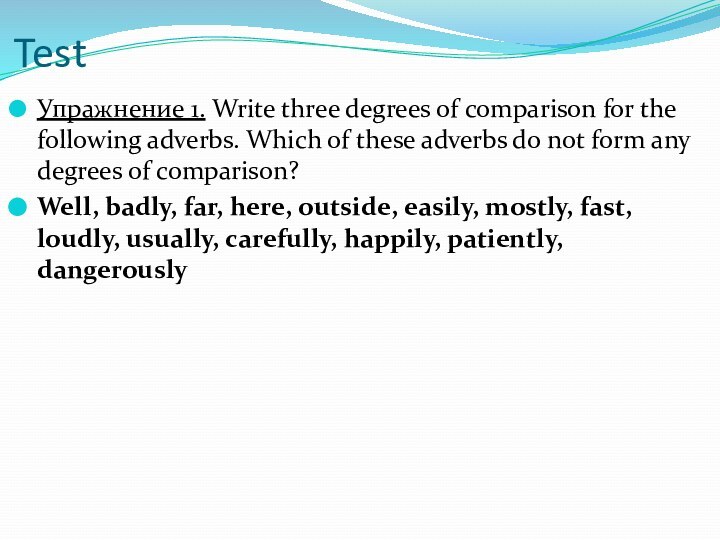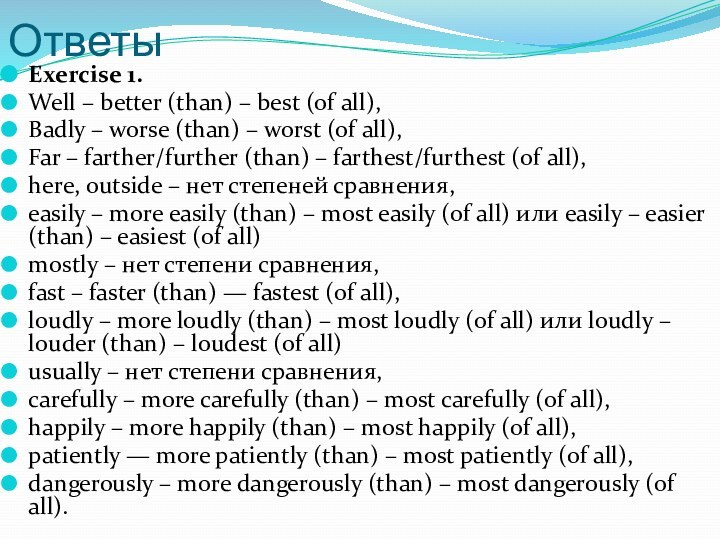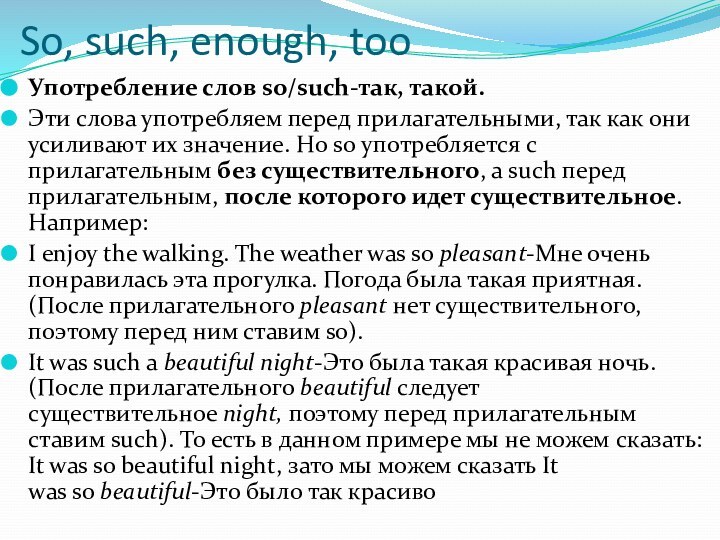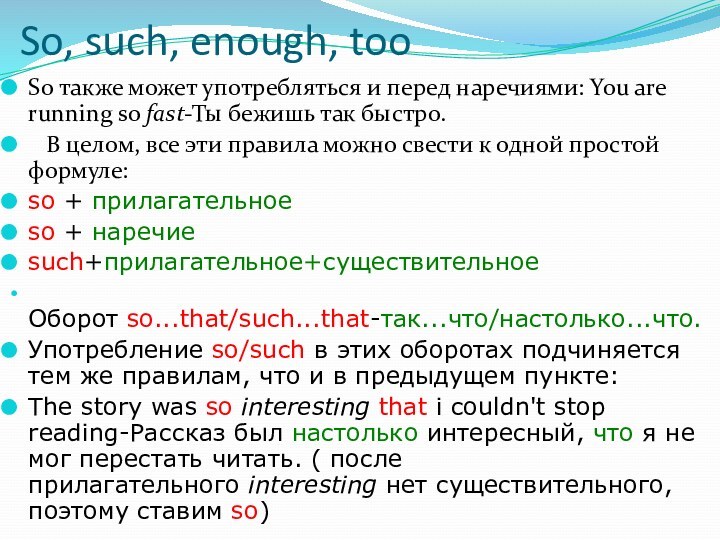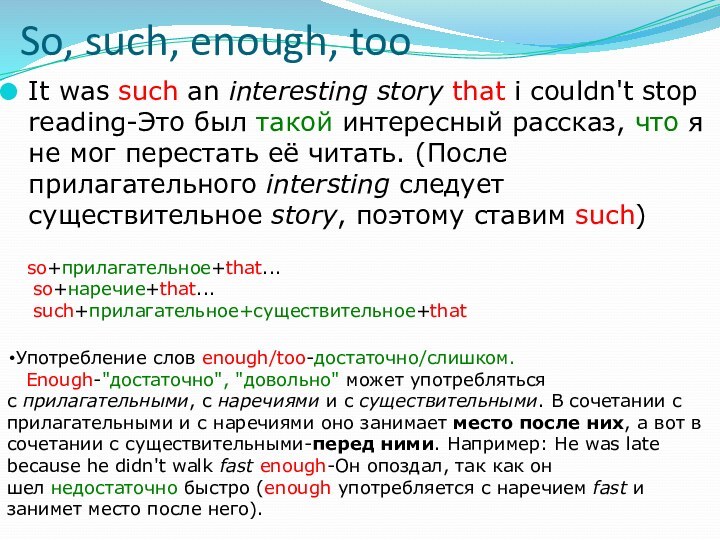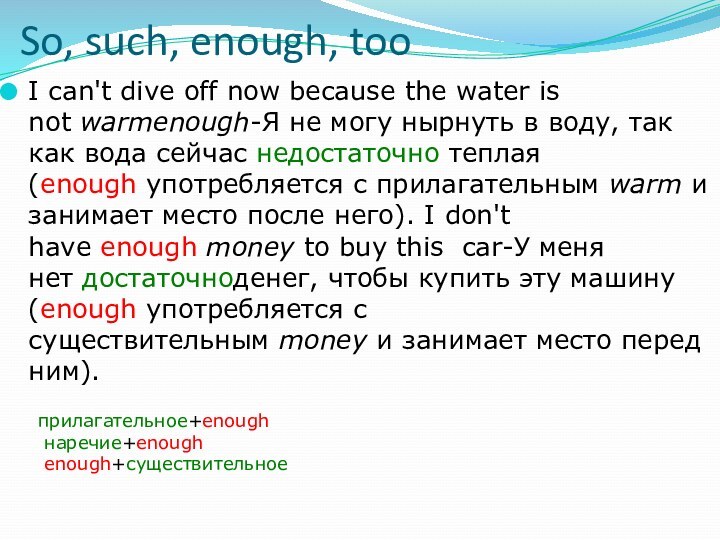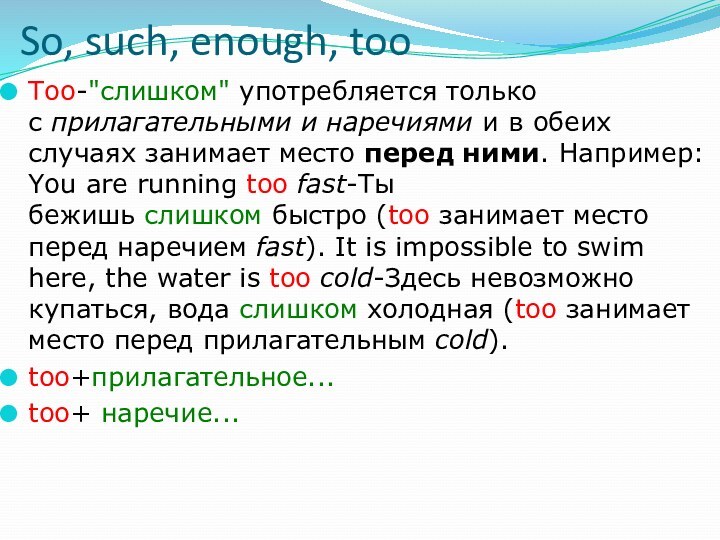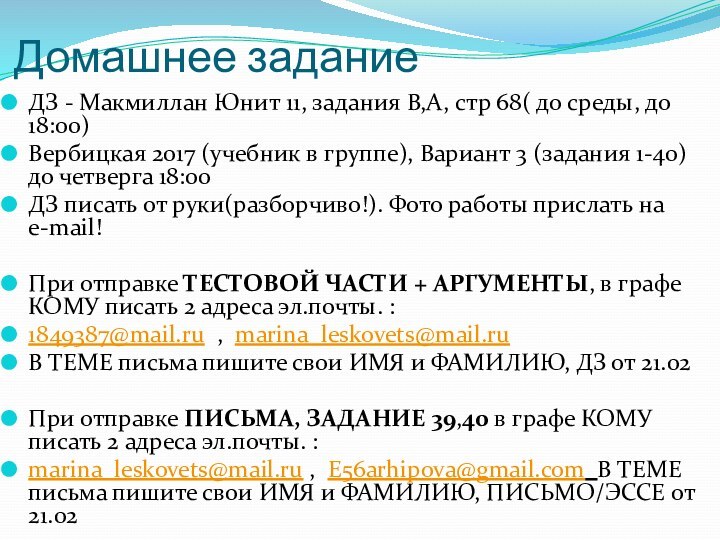Слайд 2
One-syllable adjectives
Form the comparative and superlative forms of
a one-syllable adjective by adding –er for the comparative
form and –est for the superlative.
Mary is taller than Max.
Mary is the tallest of all the students.
Max is older than John.
Of the three students, Max is the oldest.
Слайд 3
One-syllable adjectives
If the one-syllable adjective ends with an
e, just add –r for the comparative form and
–st for the superlative form.
Mary's car is larger than Max's car.
Mary's house is the largest of all the houses on the block.
Max is wiser than his brother.
Max is the wisest person I know.
Слайд 4
One-syllable adjectives
If the one-syllable adjective ends with a
single consonant with a vowel before it, double the
consonant and add –er for the comparative form; and double the consonant and add –est for the superlative form.
My dog is bigger than your dog.
My dog is the biggest of all the dogs in the neighborhood.
Слайд 5
Two-syllable adjectives
With most two-syllable adjectives, you form the
comparative with more and the superlative with most.
This morning
is more peaceful than yesterday morning.
Max's house in the mountains is the most peaceful in the world.
Max is more careful than Mike.
Of all the taxi drivers, Jack is the most careful.
Слайд 6
Two-syllable adjectives
If the two-syllable adjectives ends with –y,
change the y to i and add –er for the comparative form. For
the superlative form change the y to i and add –est.
John is happier today than he was yesterday.
John is the happiest boy in the world.
Max is angrier than Mary.
Of all of John's victims, Max is the angriest.
Слайд 7
Adjectives with three or more syllables.
For adjectives with
three syllables or more, you form the comparative with
more and the superlative with most.
John is more generous than Jack.
John is the most generous of all the people I know.
Health is more important than money.
Of all the people I know, Max is the most important.
Слайд 8
Exceptions
Irregular adjectives.
Italian food is better than American food.
My dog is the best dog in the
world.
My mother's cooking is worse than your mother's cooking.
Of all the students in
the class, Max is the worst.
Слайд 9
Exceptions
Two-syllable adjectives that follow two rules. These adjectives
can be used with -er and -est and with
more and most.
Слайд 10
Exceptions
Big dogs are gentler than small dogs.
Of all the dogs in the
world, English Mastiffs are the gentlest.
Big dogs are more gentle than small dogs.
Of all
the dogs in the world, English Mastiffs are the most gentle.
Слайд 13
Test
Jill’s a far________ (intelligent) person than my brother.
Kate was the_________ (practical) of the family.
Greg felt
__________ (bad) yesterday than the day before.
This wine is the ____________ (good) I’ve ever tasted.
Jack was the________ (tall) of the two.
Jack is the__________ (clever) of the three brothers.
If you need any ___________ (far) information, please contact our head office.
The sinking of Titanic is one of _____________ (famous) shipwreck stories of all time.
Слайд 14
Adverb
Как же образуются наречия в английском языке? Большая
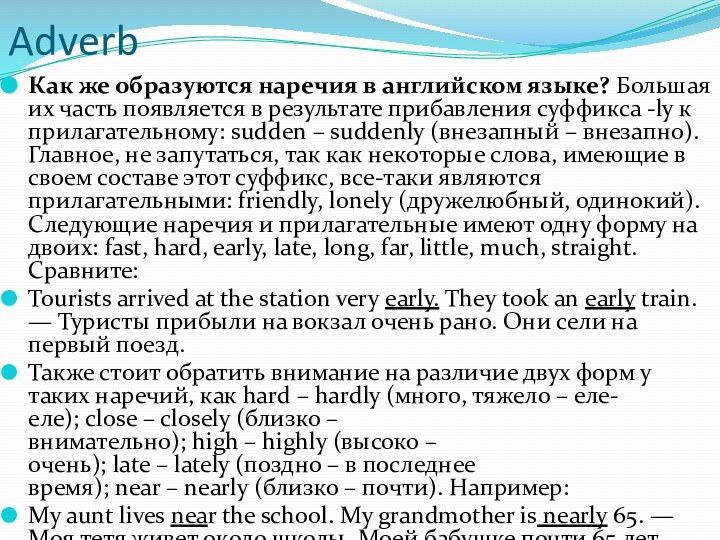
их часть появляется в результате прибавления суффикса -ly к прилагательному: sudden – suddenly (внезапный
– внезапно). Главное, не запутаться, так как некоторые слова, имеющие в своем составе этот суффикс, все-таки являются прилагательными: friendly, lonely (дружелюбный, одинокий). Следующие наречия и прилагательные имеют одну форму на двоих: fast, hard, early, late, long, far, little, much, straight. Сравните:
Tourists arrived at the station very early. They took an early train. — Туристы прибыли на вокзал очень рано. Они сели на первый поезд.
Также стоит обратить внимание на различие двух форм у таких наречий, как hard – hardly (много, тяжело – еле-еле); close – closely (близко – внимательно); high – highly (высоко – очень); late – lately (поздно – в последнее время); near – nearly (близко – почти). Например:
My aunt lives near the school. My grandmother is nearly 65. — Моя тетя живет около школы. Моей бабушке почти 65 лет.
Слайд 15
Adverb
Степени сравнения наречий в английском языке
Также как и
прилагательные, у наречия в английском языке имеют три степени сравнения:
положительная (positive degree), сравнительная (comparative degree) и превосходная (superlative degree). Чтобы образовать сравнительную и превосходную степень сравнения у наречий с суффиксом -ly, необходимо прибавить соответственно слова more (less) или most(least), которые переводятся как больше / меньше и наиболее / наименее, к положительной степени данного слова. Например:
Openly – more / less openly – most / least openly
(Открыто – более / менее открыто – наиболее / наименее открыто)
Односложные наречия, типа fast, soon и т.д. образуют степени сравнения, как и соответствующие им прилагательные, то есть при помощи суффиксов -er / -est:
Soon – sooner – soonest (скоро)
Слайд 16
Adverb
У отдельного числа наречий вообще нет степени сравнения.
К ним относятся before, here, very и другие.
А также есть группа наречий в
английском языке, которые являются исключением, так как образуют степени сравнения не по правилам. Их нужно запомнить наизусть:
Far – farther – farthest (далеко)
Far – further – furthest (далеко)
Badly – worse – worst (плохо)
Little – less – least (мало)
Much – more – most (много)
Well – better – best (хорошо)
Слайд 17
Test
Упражнение 1. Write three degrees of comparison for the
following adverbs. Which of these adverbs do not form
any degrees of comparison?
Well, badly, far, here, outside, easily, mostly, fast, loudly, usually, carefully, happily, patiently, dangerously
Слайд 18
Ответы
Exercise 1.
Well – better (than) – best (of
all),
Badly – worse (than) – worst (of all),
Far –
farther/further (than) – farthest/furthest (of all),
here, outside – нет степеней сравнения,
easily – more easily (than) – most easily (of all) или easily – easier (than) – easiest (of all)
mostly – нет степени сравнения,
fast – faster (than) — fastest (of all),
loudly – more loudly (than) – most loudly (of all) или loudly – louder (than) – loudest (of all)
usually – нет степени сравнения,
carefully – more carefully (than) – most carefully (of all),
happily – more happily (than) – most happily (of all),
patiently — more patiently (than) – most patiently (of all),
dangerously – more dangerously (than) – most dangerously (of all).
Слайд 19
So, such, enough, too
Употребление слов so/such-так, такой.
Эти слова употребляем
перед прилагательными, так как они усиливают их значение. Но so употребляется
с прилагательным без существительного, а such перед прилагательным, после которого идет существительное. Например:
I enjoy the walking. The weather was so pleasant-Мне очень понравилась эта прогулка. Погода была такая приятная. (После прилагательного pleasant нет существительного, поэтому перед ним ставим so).
It was such a beautiful night-Это была такая красивая ночь. (После прилагательного beautiful следует существительное night, поэтому перед прилагательным ставим such). То есть в данном примере мы не можем сказать: It was so beautiful night, зато мы можем сказать It was so beautiful-Это было так красиво
Слайд 20
So, such, enough, too
So также может употребляться и перед
наречиями: You are running so fast-Ты бежишь так быстро.
В целом, все эти
правила можно свести к одной простой формуле:
so + прилагательное
so + наречие
such+прилагательное+существительное
Оборот so...that/such...that-так...что/настолько...что.
Употребление so/such в этих оборотах подчиняется тем же правилам, что и в предыдущем пункте:
The story was so interesting that i couldn't stop reading-Рассказ был настолько интересный, что я не мог перестать читать. ( после прилагательного interesting нет существительного, поэтому ставим so)
Слайд 21
So, such, enough, too
It was such an interesting story that i couldn't stop
reading-Это был такой интересный рассказ, что я не мог перестать её читать. (После
прилагательного intersting cледует существительное story, поэтому cтавим such)
Употребление слов enough/too-достаточно/слишком.
Enough-"достаточно", "довольно" может употребляться с прилагательными, с наречиями и c существительными. В сочетании с прилагательными и с наречиями оно занимает место после них, а вот в сочетании с существительными-перед ними. Например: He was late because he didn't walk fast enough-Он опоздал, так как он шел недостаточно быстро (enough употребляется с наречием fast и занимет место после него).
Слайд 22
So, such, enough, too
I can't dive off now
because the water is not warmenough-Я не могу нырнуть в
воду, так как вода сейчас недостаточно теплая (enough употребляется с прилагательным warm и занимает место после него). I don't have enough money to buy this car-У меня нет достаточноденег, чтобы купить эту машину (enough употребляется с существительным money и занимает место перед ним).
Слайд 23
So, such, enough, too
Too-"слишком" употребляется только с прилагательными и наречиями и
в обеих случаях занимает место перед ними. Например: You are
running too fast-Ты бежишь слишком быстро (too занимает место перед наречием fast). It is impossible to swim here, the water is too cold-Здесь невозможно купаться, вода слишком холодная (too занимает место перед прилагательным cold).
too+прилагательное...
too+ наречие...
